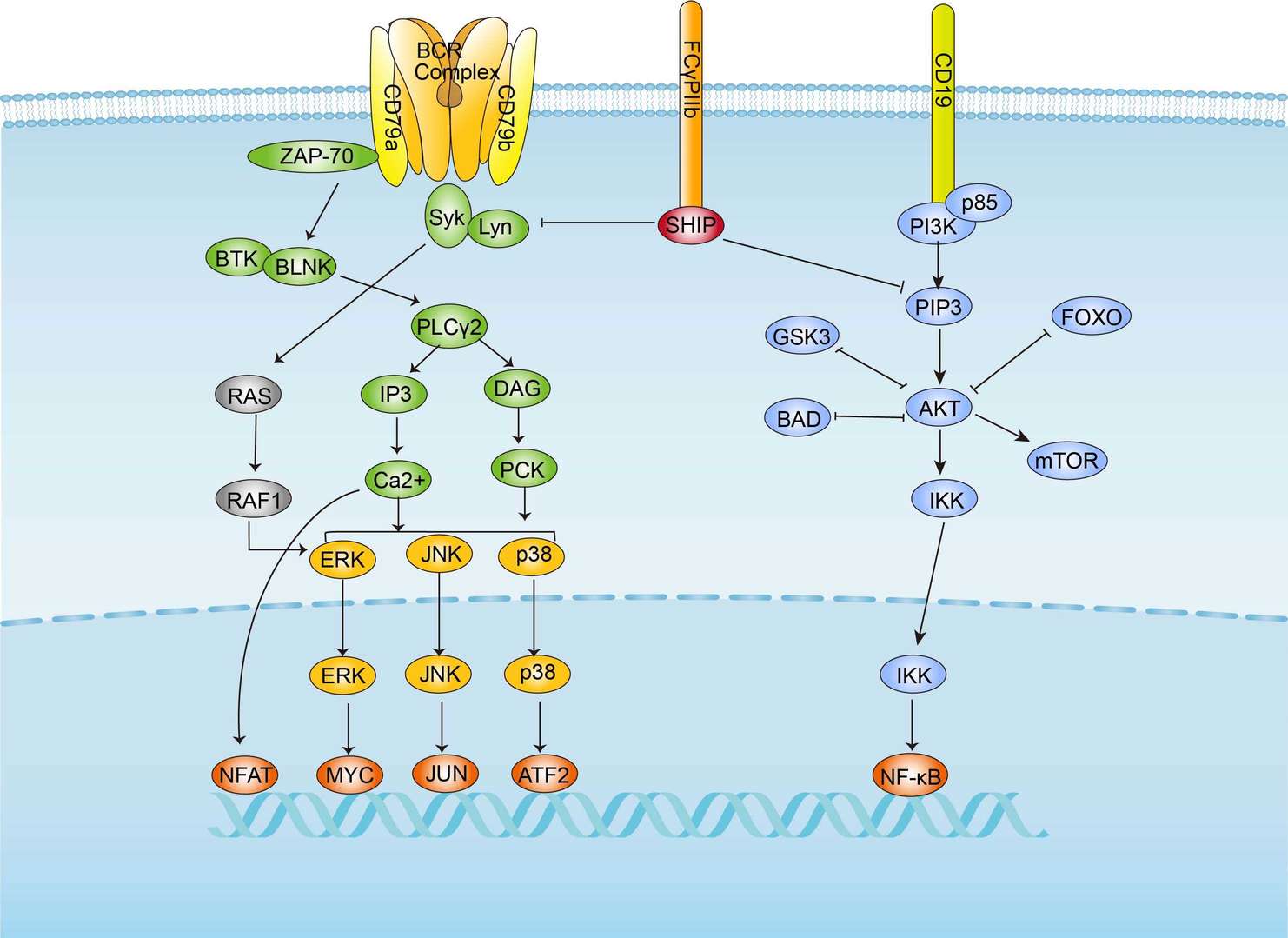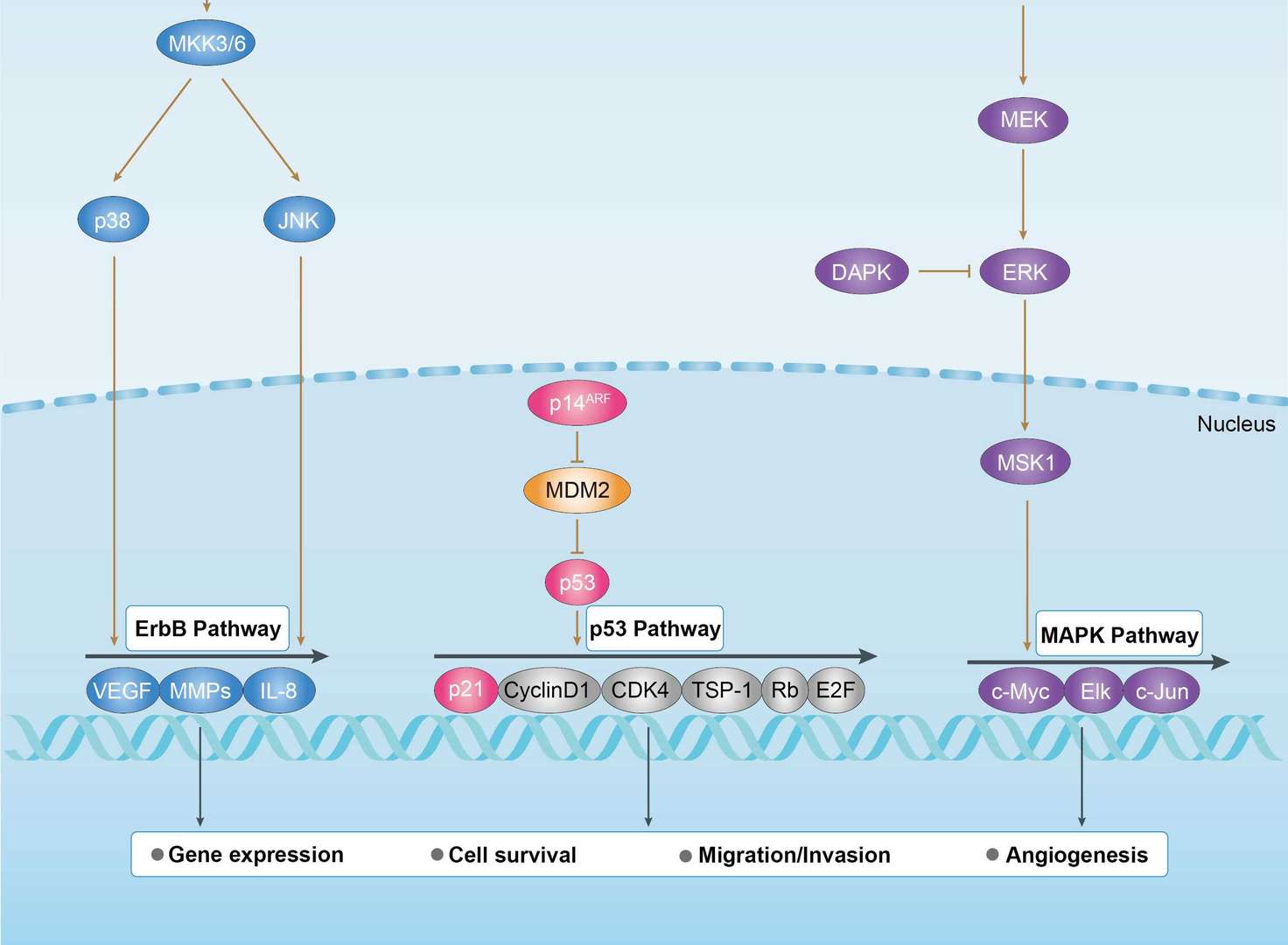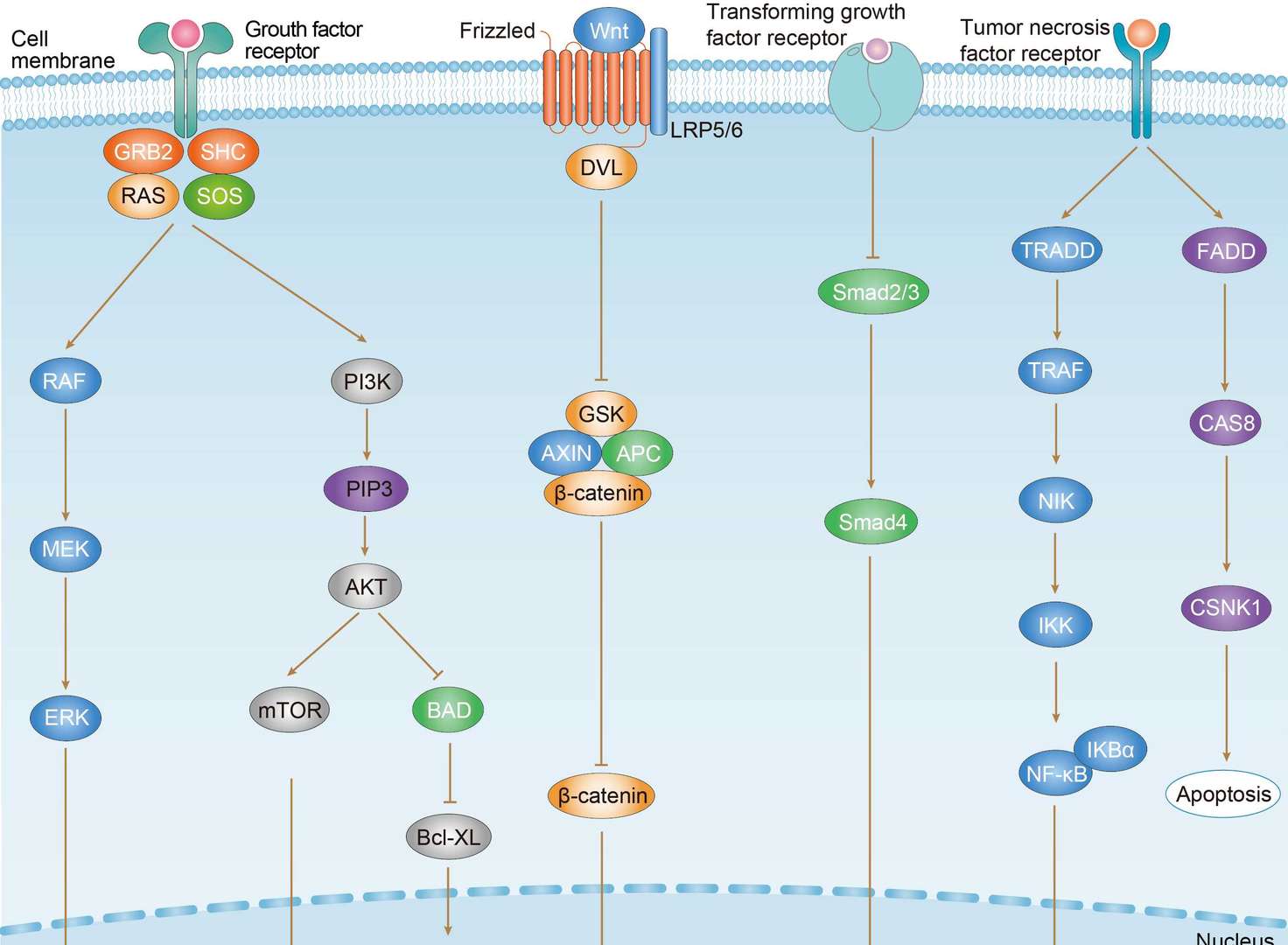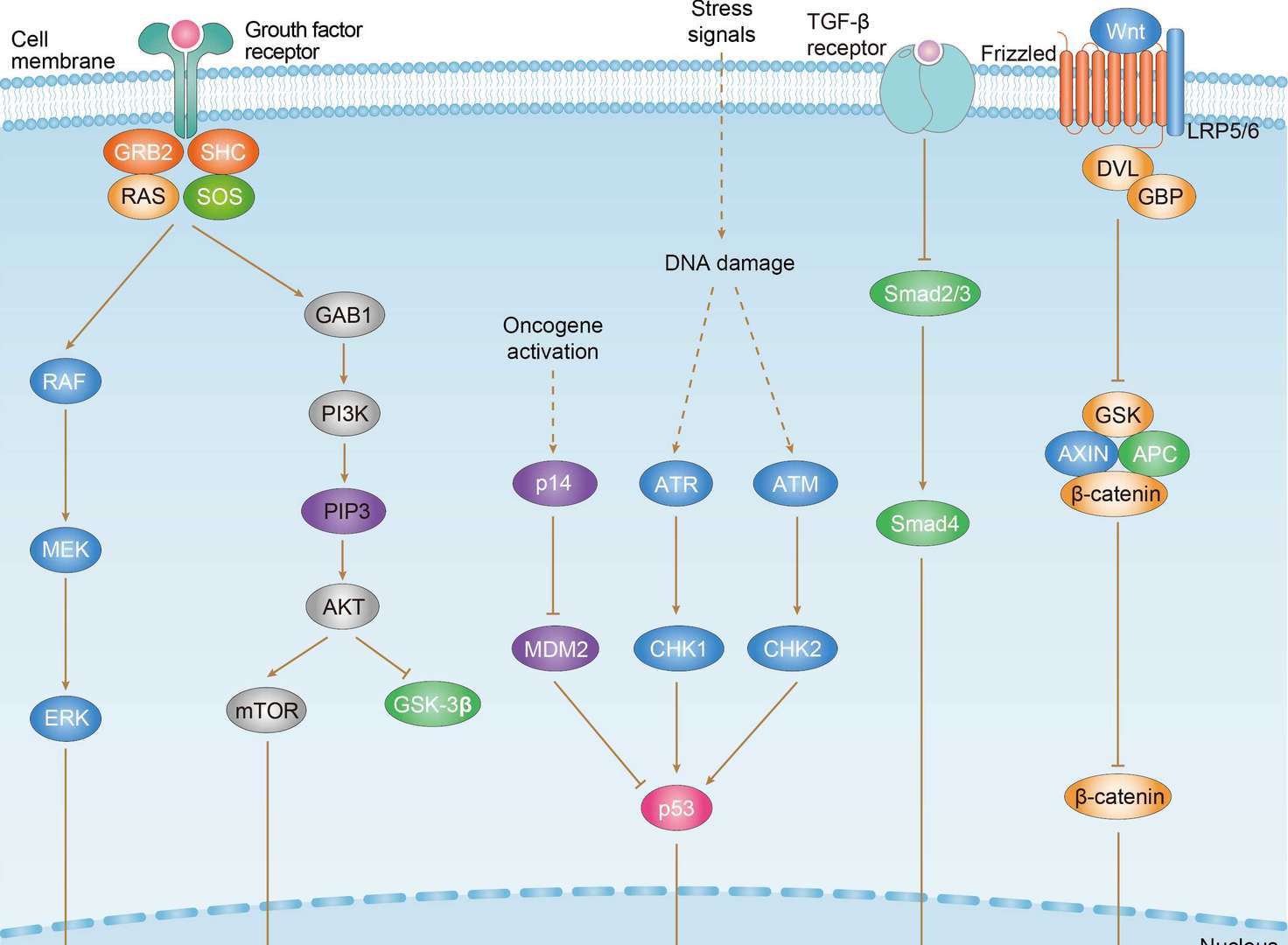Recombinant Mouse Anti-MYC Antibody (VS4-CJ47)
CAT#: VS4-CJ47
This mouse anti-MYC antibody is a product that recognizes human MYC. The immunogen of this antibody is a synthesized peptide derived from C-terminal (410aa-432aa) of human c-Myc conjugated with KLH. This product has been tested for use in ELISA, Western Blot (1:500-1:5000).













Specifications
- Immunogen
- Peptide sequence derived from C-terminal (410aa-432aa) of human c-Myc conjugated with KLH.
- Host Species
- Mouse
- Type
- Mouse IgG1
- Specificity
- Human MYC
- Species Reactivity
- Human
- Applications
- ELISA, WB
- Conjugate
- Unconjugated
Product Property
- Purity
- >95% as determined by SDS-PAGE
- Format
- Liquid
- Buffer
- 50% Glycerol, 150mM NaCl, PBS, pH 7.4.
- Preservative
- 0.02% Sodium Azide
- Storage
- Store at -20°C or -80°C upon receipt. Avoid repeated freeze.
Applications
- Application Notes
- This antibody has been tested for use in ELISA, Western Blot (1:500-1:5000).
Target
- Alternative Names
- MYC proto-oncogene protein; Class E basic helix-loop-helix protein 39; bHLHe39; Proto-oncogene c-Myc; Transcription factor p64; MYC; BHLHE39
- Gene ID
- 4609
- UniProt ID
- P01106
- Long Name
- MYC proto-oncogene, bHLH transcription factor
- Cellular Localization
- Nucleus
- Post Translation Modifications
- Phosphorylated by PRKDC (PubMed:1597196).
Phosphorylation at Ser-329 by PIM2 leads to the stabilization of MYC (By similarity).
Phosphorylation at Ser-62 by CDK2 prevents Ras-induced senescence (PubMed:19966300, PubMed:20713526).
Phosphorylated at Ser-62 by DYRK2; this primes the protein for subsequent phosphorylation by GSK3B at Thr-58 (PubMed:22307329).
Phosphorylation at Thr-58 and Ser-62 by GSK3 is required for ubiquitination and degradation by the proteasome (PubMed:15103331, PubMed:17558397, PubMed:8386367).
Dephosphorylation at Ser-62 by protein phosphatase 2A (PPP2CA) promotes its degradation; interaction with PPP2CA is enhanced by AMBRA1 (PubMed:25803737, PubMed:25438055).
Ubiquitinated by the SCF(FBXW7) complex when phosphorylated at Thr-58 and Ser-62, leading to its degradation by the proteasome (PubMed:15103331, PubMed:17558397, PubMed:25775507).
In the nucleoplasm, ubiquitination is counteracted by USP28, which interacts with isoform 1 of FBXW7 (FBW7alpha), leading to its deubiquitination and preventing degradation (PubMed:17873522, PubMed:17558397).
In the nucleolus, however, ubiquitination is not counteracted by USP28 but by USP36, due to the lack of interaction between isoform 3 of FBXW7 (FBW7gamma) and USP28, explaining the selective MYC degradation in the nucleolus (PubMed:17558397, PubMed:25775507).
Also polyubiquitinated by the DCX(TRPC4AP) complex (PubMed:20551172, PubMed:29779948).
Ubiquitinated by TRIM6 in a phosphorylation-independent manner (By similarity).
- Protein Refseq
- NP_002458.2
- Function
- Transcription factor that binds DNA in a non-specific manner, yet also specifically recognizes the core sequence 5'-CAC[GA]TG-3' (PubMed:24940000, PubMed:25956029).
Activates the transcription of growth-related genes (PubMed:24940000, PubMed:25956029).
Binds to the VEGFA promoter, promoting VEGFA production and subsequent sprouting angiogenesis (PubMed:24940000, PubMed:25956029).
Regulator of somatic reprogramming, controls self-renewal of embryonic stem cells (By similarity).
Functions with TAF6L to activate target gene expression through RNA polymerase II pause release (By similarity).
Positively regulates transcription of HNRNPA1, HNRNPA2 and PTBP1 which in turn regulate splicing of pyruvate kinase PKM by binding repressively to sequences flanking PKM exon 9, inhibiting exon 9 inclusion and resulting in exon 10 inclusion and production of the PKM M2 isoform (PubMed:20010808).
Customer Review
There are currently no Customer reviews or questions for VS4-CJ47. Click the button above to contact us or submit your feedback about this product.
Submit Your Publication
Published with our product? Submit your paper and receive a 10% discount on your next order! Share your research to earn exclusive rewards.
Related Signaling Pathways
Related Diseases
Downloadable Resources
Download resources about recombinant antibody development and antibody engineering to boost your research.
Product Notes
This is a product of Creative Biolabs' Hi-Affi™ recombinant antibody portfolio, which has several benefits including:
• Increased sensitivity
• Confirmed specificity
• High repeatability
• Excellent batch-to-batch consistency
• Sustainable supply
• Animal-free production
See more details about Hi-Affi™ recombinant antibody benefits.
Datasheet
MSDS
COA
Certificate of Analysis LookupTo download a Certificate of Analysis, please enter a lot number in the search box below. Note: Certificate of Analysis not available for kit components.
Isotype Control
- CAT
- Product Name
Secondary Antibody
- CAT
- Product Name
Recommended Dilution Buffer
- CAT
- Product Name
See other products for "MYC"
Select a product category from the dropdown menu below to view related products.
| CAT | Product Name | Application | Type |
|---|---|---|---|
| PABL-281 | Mouse Anti-MYC Recombinant Antibody (clone 9E10) | WB, IHC, FuncS | Mouse IgG |
| CAT | Product Name | Application | Type |
|---|---|---|---|
| PSBL-281 | Mouse Anti-MYC Recombinant Antibody (clone 9E10); scFv Fragment | WB, IHC, FuncS | Mouse scFv |
| CAT | Product Name | Application | Type |
|---|---|---|---|
| PFBL-281 | Mouse Anti-MYC Recombinant Antibody (clone 9E10); Fab Fragment | WB, IHC, FuncS | Mouse Fab |
| CAT | Product Name | Application | Type |
|---|---|---|---|
| MOB-0400MC | Anti-c-Myc antibody (HRP) | ELISA, IHC-P, IHC-Fr, WB |
| CAT | Product Name | Application | Type |
|---|---|---|---|
| MOB-0268CT | Recombinant Mouse anti-Human MYC Monoclonal antibody (4H40) | ELISA, ICC, IF, IHC-P, IP, WB |
| CAT | Product Name | Application | Type |
|---|---|---|---|
| BRD-0380MZ | Chicken Anti-c-Myc (ab1) Polyclonal IgY | Indirect ELISA, WB | Chicken antibody |
| CAT | Product Name | Application | Type |
|---|---|---|---|
| BRD-0381MZ | Chicken Anti-c-Myc (ab2) Polyclonal IgY | WB | Chicken antibody |
| CAT | Product Name | Application | Type |
|---|---|---|---|
| MOR-2336 | Hi-Affi™ Recombinant Rabbit Anti-MYC Monoclonal Antibody (DS2336AB) | WB, IP, ICC | IgG |
| CAT | Product Name | Application | Type |
|---|---|---|---|
| MOR-4554 | Hi-Affi™ Recombinant Rabbit Anti-MYC Monoclonal Antibody (TH64DS) | WB, IF, ICC, FC | IgG |
| CAT | Product Name | Application | Type |
|---|---|---|---|
| FAMAB-0112-CN | Mouse Anti-MYC Recombinant Antibody (clone CT14) | ELISA, WB, FC, Inhib | Mouse IgG2a |
| CAT | Product Name | Application | Type |
|---|---|---|---|
| FAMAB-0112-CN-S(P) | Mouse Anti-MYC Recombinant Antibody (clone CT14); scFv Fragment | ELISA, WB, FC | Mouse scFv |
| CAT | Product Name | Application | Type |
|---|---|---|---|
| FAMAB-0112-CN-F(E) | Mouse Anti-MYC Recombinant Antibody (clone CT14); Fab Fragment | ELISA, WB, FC | Mouse Fab |
| CAT | Product Name | Application | Type |
|---|---|---|---|
| MRO-1778-CN | Rabbit Anti-MYC Polyclonal Antibody (MRO-1778-CN) | WB | Rabbit IgG |
| CAT | Product Name | Application | Type |
|---|---|---|---|
| MRO-1779-CN | Rabbit Anti-MYC Polyclonal Antibody (MRO-1779-CN) | WB | Rabbit IgG |
| CAT | Product Name | Application | Type |
|---|---|---|---|
| MOR-0050-FY | Rabbit Anti-MYC Recombinant Antibody (clone AFY0021) | ICC, IHC, WB | Rabbit IgG |
| CAT | Product Name | Application | Type |
|---|---|---|---|
| VS-0424-XY194 | AbPlus™ Anti-MYC Magnetic Beads (33) | IP, Protein Purification |
| CAT | Product Name | Application | Type |
|---|---|---|---|
| VS-1024-XY133 | Mouse Anti-NHP MYC Recombinant Antibody (clone MYC699) | IF, FC, ELISA | Mouse IgG1, kappa |
| CAT | Product Name | Application | Type |
|---|---|---|---|
| VS-0525-XY4607 | Anti-MYC Immunohistochemistry Kit | IHC |
| CAT | Product Name | Application | Type |
|---|---|---|---|
| VS-0525-XY4608 | Anti-Human MYC Immunohistochemistry Kit | IHC |
| CAT | Product Name | Application | Type |
|---|---|---|---|
| VS-0525-XY4609 | Anti-Mouse MYC Immunohistochemistry Kit | IHC |
| CAT | Product Name | Application | Type |
|---|---|---|---|
| VS-0825-YC263 | SmartAb™ Recombinant Anti-MYC pH-dependent Antibody (Clone CT14) | ELISA, WB, FC, Inhib | Mouse IgG2a |
| CAT | Product Name | Application | Type |
|---|---|---|---|
| VS-1025-YC55 | Anti-MYC Antibody Prodrug, Protease Activated (CT14) | ISZ, Cyt, FuncS |
Popular Products

Application: IF, IP, Neut, FuncS, ELISA, FC, ICC

Application: ELISA, FC, IP, FuncS, IF, Neut, ICC

Application: WB, FuncS, IF, Neut, ELISA, FC, IP

Application: FC, IP, ELISA, Neut, FuncS, IF, WB

Application: FuncS, IF, Neut, ELISA, FC, IP, IHC

Application: ELISA, Neut, IF, IP, FC, FuncS

Application: Neut, ELISA, IF, IP, FuncS, FC, ICC

Application: IF, IP, Neut, FuncS, ELISA, FC, ICC

Application: FC, IP, ELISA, Neut, FuncS, IF, ICC

Application: Neut, ELISA, IF, IP, FuncS, FC, ICC

Application: ELISA, FC, IP, FuncS, IF, Neut, ICC

Application: ELISA, FC, IP, FuncS, IF, Neut, ICC
-2-1.png)
Application: IP, IF, FuncS, FC, Neut, ELISA, IHC

Application: WB, Neut, ELISA, IF, IP, FuncS, FC
For research use only. Not intended for any clinical use. No products from Creative Biolabs may be resold, modified for resale or used to manufacture commercial products without prior written approval from Creative Biolabs.
This site is protected by reCAPTCHA and the Google Privacy Policy and Terms of Service apply.
















 BCR Signaling Pathway
BCR Signaling Pathway
 Bladder Cancer
Bladder Cancer
 Breast Cancer
Breast Cancer
 Colorectal Cancer
Colorectal Cancer
 Gastric Cancer
Gastric Cancer








